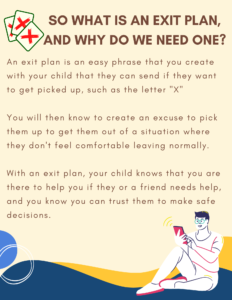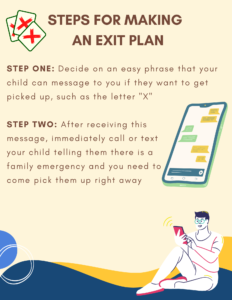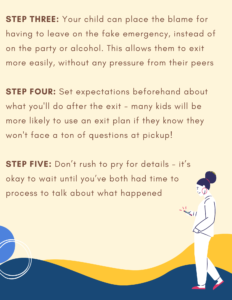
Have you ever talked with your kids about what they should do if they find themselves in an uncomfortable situation, but don’t want to leave or look uncool in front of their friends? Every parent should sit down with their child and make an exit plan. An exit plan is a shared solution to the problem of wanting to leave but not wanting to make that obvious.

There are lots of different ways to implement an exit plan with your child. One common option is the X Plan- here’s how it works:
- You and your child have an honest conversation about some situations they could find themselves in where they may become uncomfortable and want to leave. This could be a small gathering that suddenly becomes much larger, or a party with alcohol and other drugs.
- You and your child decide on an easy phrase that they can message to you if they want to get picked up. In this example, that would be just the letter X. Choose something together that is clear and works for both of you.
- After receiving this message, you immediately call or text your child and tell them that there is a family emergency and you need to come pick them up right away.
- Your child can now place the blame for having to leave on you and the emergency, instead of on the party or alcohol. This relieves some pressure they may feel in front of their peers, and allows them to exit more easily.
- Make sure you talk beforehand about what will happen after you have picked up your child. It’s important to discuss with your child about whether you’ll ask questions or pry for details if they use this plan – many kids are more likely to use an exit plan if they know they won’t face a ton of questions at pickup. Those conversations can always wait until you both have had time to process the situation.
A critical component of an exit plan is the understanding between you and your child that they can tell you as much or as little as they want about what happened or why they chose to use it.
Having a policy of no questions, no judgments may sound like it encourages dishonesty, but it actually helps to build trust and honesty between you and your child. It may be hard for you, but it shows your child that you value their safety and personal boundaries, and will likely make them want to open up, rather than feel like they have to.
But do be sure to include in your conversation what to do if they think someone is in danger. Remind your child that if a person is unconscious, cold or clammy, breathing slowly, or vomiting while unconscious, they should call 911 immediately. The New York State Good Samaritan Law protects against possessing alcohol while underage – this can empower your child to help save someone’s life.



To learn more about exit plans and how they can help you and your child, we recommend reading these articles:
X-Plan: Giving your kids a way out
If you’re looking for more information, we also recommend watching Don’t Wait, a movie about how and when to talk to your children about substance use. The NCUFY sponsored license to watch has expired, but you can rent it at their website.
You can also access the excellent film discussion guide for free here: Don’t Wait Discussion Guide
